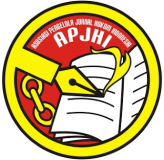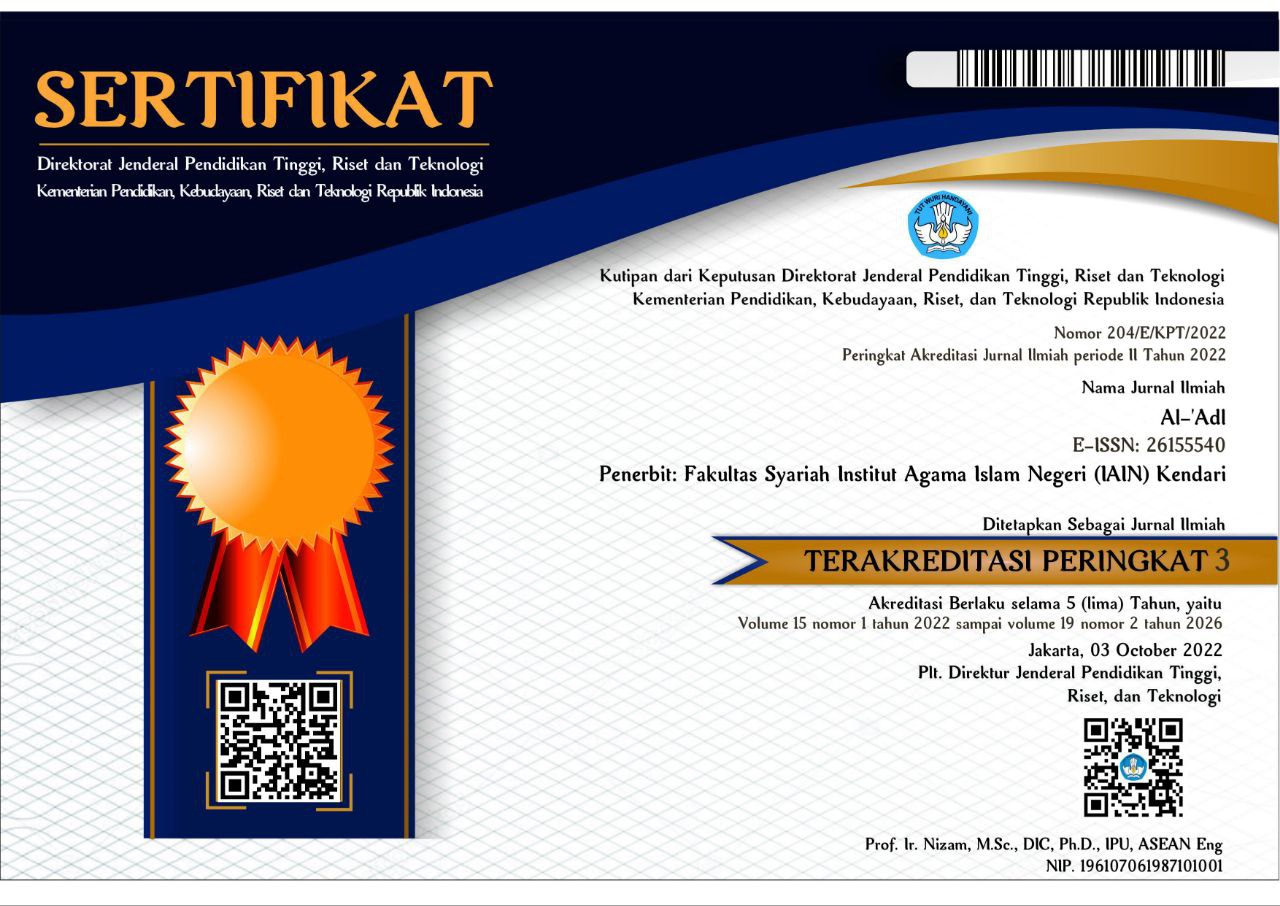- Focus and Scope
- Section Policies
- Peer Review Process
- Publication Frequency
- Open Access Policy
- Publication Fee
- Publication Ethics & Statement
Focus and Scope
Al-'Adl is an academic journal published twice a year by the Sharia Faculty of IAIN Kendari. Al-'Adl specifically publishes the results of the transdisciplinary study between the study of law and social institutions with Islamic studies. The journal focuses:
Islamic Law Studies (Fiqh, Ushul Fiqh, Islamic family law, Islamic criminal law, Islamic political law, Islamic economic law, Islamic astronomy)
Integration of Islamic law studies with civil law, constitutional law, criminal law, customary law, agrarian law, international law, labor law.
Integration of Islamic legal studies with social institutions.
Section Policies
Articles
Peer Review Process
This journal displays articles online after being reviewed by reviewers. Articles sent to this online journal will be peer-reviewed at least two reviewers in the form of "double-blind review". The main language used in this journal is Indonesian and still accepts English or Arabic articles. Review process with a double-blind review for 3 weeks.
Article status is accepted if it is in accordance with focus and scope, clarity of purpose, method, and results, has a gap analysis, enough primary data for the past 10 years, and follows the style and format of writing from Al-'Adl.
Article status is revised if it does not explain the objectives, methods, and results, does not display a gap analysis, does not have primary data for the past 10 years, and does not follow the style and format of writing from Al-'Adl.
Article status is rejected if it is not in accordance with focus and scope, does not determine objectives, methods, and results, does not have gap analysis, does not have primary data, and does not match the style and format of writing from Al-'Adl.
Publication Frequency
This journal is published twice a year, January and July.
Open Access Policy
This journal provides immediate open access to its content on the principle that making research freely available to the public supports a greater global exchange of knowledge.
Publication Fee
Article Submission:
0.00 (IDR) Authors ARE NOT REQUIRED to pay an Article Submission Fee as part of the submission process.
Article Publication:
Article Publishing Charges (APCs): 700.000,00 (IDR)
Authors are required to pay Article Publishing Charges (APCs) as part of the publication process.
Publication Ethics & Statement
Publication Ethics and Statement Al-‘Adl is a peer-reviewed journal, published twice a year by Fakultas Syariah IAIN Kendari. It is available online as open access sources as well as in print. This statement clarifies the ethical behavior of all parties involved in the act of publishing an article in this journal, including the author, the editor-in-chief, the Editorial Board, the reviewer, and the publisher. This statement is based on COPE’s Best Practice Guidelines for Journal Editors. Ethical Guideline for Journal Publication The publication of an article in Al-‘Adl is an essential building block in the development of a coherent and respected network of knowledge. It is a direct reflection of the quality of the work of the authors and the institutions that support them. Peer-reviewed articles support and embody the scientific methods. It is therefore important to agree upon standards of expected ethical behavior for all parties involved in the act of publishing: the author, the editor, the reviewer, the publisher, and the society. As the publisher of Al-‘Adl, Fakultas Syariah IAIN Kendari takes its duties of guardianship over all stages of publishing seriously and it recognizes its ethical and other responsibilities. Fakultas Syariah IAIN Kendari committed to ensuring that advertising, reprint or other commercial revenue has no impact or influence on editorial decisions.Publication Decisions The editors of Al-‘Adl is responsible for deciding which articles submitted to the journal should be published. The validation of the work in question and its importance to researchers and readers must always drive such decisions. The editors may be guided by the policies of the journal's editorial board and constrained by such legal requirements as shall then be in force regarding libel, copyright infringement, and plagiarism. The editors may confer with other editors or reviewers in making their decisions. Plagiarism Screening It is basically the author’s duty to only submit a manuscript that is free from plagiarism and academically malpractices. The editor, however, double checks each article before its publication. The first step is to check plagiarism against offline database developed by Al-‘Adl, Fakultas Syariah IAIN and, secondly, against as much as possible online databases. Fair Play An editor at any time evaluates manuscripts for their intellectual content without regard to race, gender, sexual orientation, religious belief, ethnic origin, citizenship, or political philosophy of the authors. Confidentiality The editors and any editorial staff must not disclose any information about a submitted manuscript to anyone other than the corresponding author, reviewers, potential reviewers, other editorial advisers, and the publisher, as appropriate. Disclosure and Conflicts of Interest Unpublished materials disclosed in a submitted manuscript must not be used in editors' own research without the express written consent of the author. Duties of Reviewers Contribution to Editorial Decisions Peer review assists the editors in making editorial decisions and through the editorial communications with the authors may also assist the author in improving the quality of the paper. Promptness Any selected referee who feels unqualified to review the research reported in a manuscript or knows that its prompt review will be impossible should notify the editors and excuse himself from the review process. Confidentiality Any manuscripts received for review must be treated as confidential documents. They must not be shown to or discussed with others except as authorized by the editor. Standards of Objectivity Reviews should be conducted objectively. Personal criticism of the author is inappropriate. Referees should express their views clearly with supporting arguments. Acknowledgment of Sources Reviewers should identify relevant published work that has not been cited by the authors. Any statement that an observation, derivation, or argument had been previously reported should be accompanied by a proper citation. A reviewer should also call to the editors' attention any substantial similarity or overlap between the manuscript under consideration and any other published paper of which they have personal knowledge. Disclosure and Conflict of Interest Privileged information or ideas obtained through peer review must be kept confidential and not used for personal advantage. Reviewers should not consider manuscripts in which they have conflicts of interest resulting from competitive, collaborative, or other relationships with any of the authors, companies, or institutions related to the papers. Review Process Every manuscript submitted to Al-‘Adl is independently reviewed by at least two reviewers in the form of "double-blind review". The decision for publication, amendment, or rejection is based upon their reports/recommendations. In certain cases, the editor may submit an article for review to another, the third reviewer before making a decision, if necessary. Duties of Authors Reporting Standards Authors of reports of original research should present an accurate account of the work performed as well as an objective discussion of its significance. Underlying data should be represented accurately in the paper. A paper should contain sufficient detail and references to permit others to replicate the work. Fraudulent or knowingly inaccurate statements constitute unethical behavior and are unacceptable. Originality and Plagiarism The authors should ensure that they have written entirely original works, and if the authors have used the work and/or words of others that this has been appropriately cited or quoted. Multiple, Redundant, or Concurrent Publication An author should not in general publish manuscripts describing essentially the same research in more than one journal or primary publication. Submitting the same manuscript to more than one journal concurrently constitutes unethical publishing behavior and is unacceptable. Acknowledgment of Sources Proper acknowledgment of the work of others must always be given. Authors should cite publications that have been influential in determining the nature of the reported work. Authorship of the Paper Authorship should be limited to those who have made a significant contribution to the conception, design, execution, or interpretation of the reported research. All those who have made significant contributions should be listed as co-authors. Where there are others who have participated in certain substantive aspects of the research project, they should be acknowledged or listed as contributors. The corresponding author should ensure that all appropriate co-authors and no inappropriate co-authors are included on the paper and that all co-authors have seen and approved the final version of the paper and have agreed to its submission for publication. Disclosure and Conflicts of Interest All authors should disclose in their manuscript any financial or other substantive conflicts of interest that might be construed to influence the results or interpretation of their manuscript. All sources of financial support for the project should be disclosed. Fundamental errors in Published Works When an author discovers a significant error or inaccuracy in his/her own published work, it is the author’s obligation to promptly notify the journal editor or publisher and cooperate with the editor to retract or correct the paper.
Plagiarism Screening
It is basically author’s duty to only submit a manuscript that is free from plagiarism and academically malpractices. The editor, however, double checks each article before its publication. The first step is to check plagiarism against offline database developed by Islamic State Institute of Kendari and, secondly, against as much as possible online databases.
Fair Play
An editor at any time evaluates manuscripts for their intellectual content without regard to race, gender, sexual orientation, religious belief, ethnic origin, citizenship, or political philosophy of the authors.
Confidentiality
The editors and any editorial staff must not disclose any information about a submitted manuscript to anyone other than the corresponding author, reviewers, potential reviewers, other editorial advisers, and the publisher, as appropriate.

















